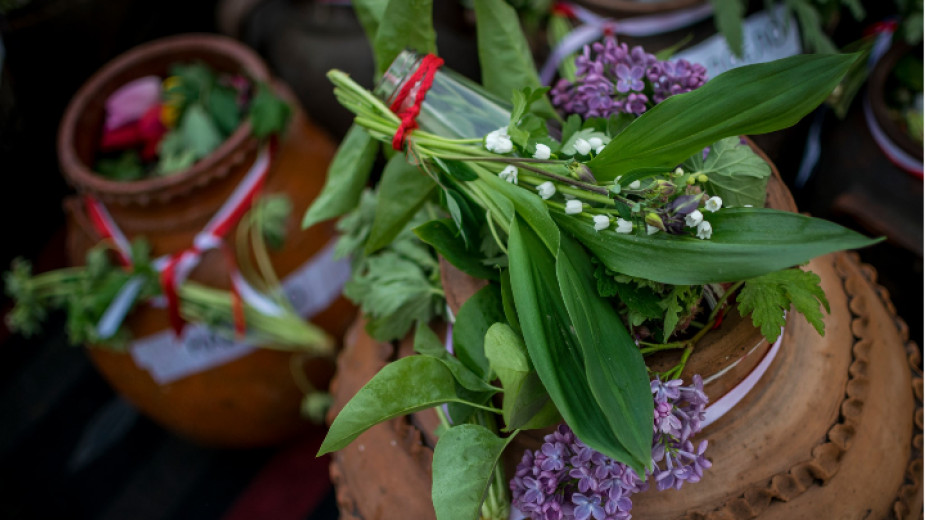 7
7
In the town of Yakoruda in Southwestern Bulgaria, the preparations for one of the best-loved holidays Gergiovden, St. George’s Day, start on the day before, 5 May, when, early in the morning, the lasses and young brides take the colourful Yakoruda rugs out of their boxes to lend colour to their town for the grand day. And in the evening, before the sun sets, in their richly decorated traditional clothing typical of the region, the amateur performers from the Svetlina-1907 chitalishte (community culture club) in the town go out into the town square to reenact an ancient ritual “dipping the posy”, a ritual connected with the belief in good and evil, and the hope of health and fertility.

“The posy is made up of spring flowers, bound by a red thread to a small bottle which we dip into a clay jar,” explains Iva Rashkova in an interview with Radio Bulgaria. “The jars are filled with water and the ritual can begin.”

The older women start to sing an emblematic song – St. George – which is only sung on this day, and the first-born girls in the families start to dip the flowers, arranged around an icon of St. George.
Reenactment of “dipping the posy” at the open-air Regional Ethnographic Museum Etara by a female folklore group from Svetlina-1907 chitalishte, Yakoruda, 2022. The song is “St. George”.
The jars are covered with a piece of red cloth and left overnight underneath a white or a red rose bush. And late in the evening the people come out to dance the horo in the town square.

“On the following day, again before sunset, we start to take the posies out,” Iva Rashkova goes on. “But this time this is done not by the first- but by the last-born child in the family, who makes an incantation for each person who takes a posy – usually for health, happiness and fertility. After fishing the posies out, the girls wash their faces to make them “red and white”, and the woman of the house takes the flowers and hangs them up high – to bring luck to the home. The water from the bottle is used for sprinkling – with a wish for health to humans, to the home, and to the animals.”

“Dipping the posy” ends with a celebration on St. George’s day itself, 6 May. Interestingly, in Yakoruda, it is celebrated by Christians and Muslims together.

“People in Yakoruda go to the St. George the Victor church in the town’s suburbs, which is actually the spot where old Yakoruda was once located before it burnt down in 1666. And Christians, along with Muslims gift lambs for the feast day. And then the celebration begins, in which we all take part, together,” Iva Rashkova says.

More:
Translated from the Bulgarian and posted by Milena Daynova
Photos: Svetlina-1907 chitalishte
Passion Week is the last week before Easter. It is also the most austere week of fasting at the end of the long Great Lent, which prepares the faithful for Christ's Resurrection. It begins after the Sunday on which Christians celebrate the Lord's entry..
The Zograf Monastery on Mount Athos has a new abbot. Hieromonk Gavriil has been elected as the new abbot of the monastery, reported the website of the Bulgarian Orthodox Church. "On Lazarus Saturday, the Zograf Monastery on Mount Athos held elections to..
Pipes from the end of the 17 th , the 18 th and the 19 th century and the tradition of growing tobacco in Bulgaria are presented in the newest exposition at the Museum of Archaeology in Burgas. “Pipes like this are to be found often on the..
On 20 April, all Christians will celebrate the Resurrection of Christ. Against the backdrop of our divided and troubled world, Catholics, together with..
On Good Friday, the saddest day for Christians, the liturgy commemorates the suffering, crucifixion and death of Jesus Christ, who sacrificed..
Holy Saturday services begin on Friday evening with Vespers. The Church commemorates the burial of Christ the Saviour and His descent into hell to save the..

+359 2 9336 661
